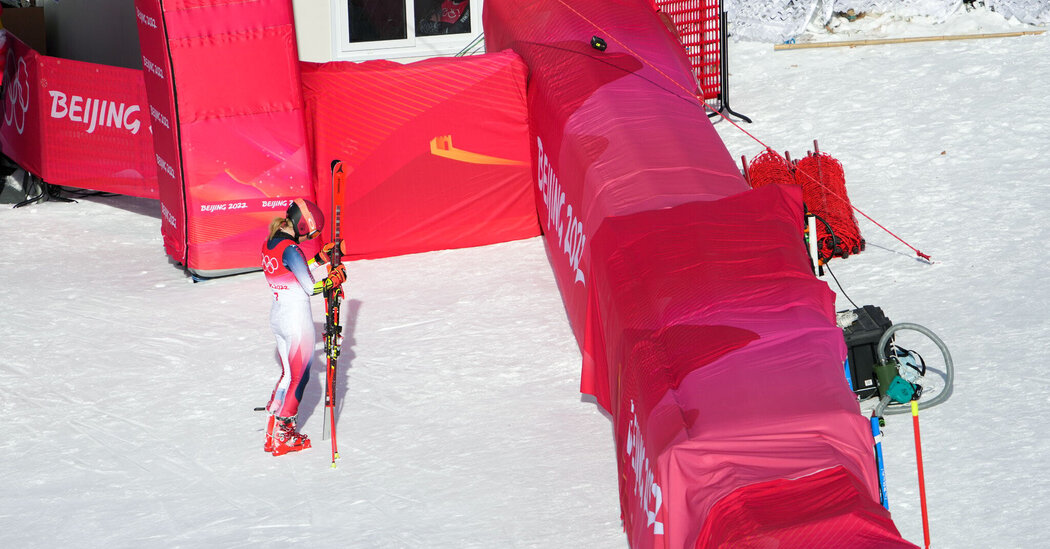
Every Olympics delivers its own crushing surprises, the ill-timed pulled hamstring, the jump a figure skater fails to land.
On Monday, under bright sunny skies in Yanqing, it was the American star Mikaela Shiffrin’s turn to experience that sort of heartbreak. But Shiffrin’s failure to survive an left turn early in her Beijing debut in the giant slalom did not have the drama of her sport’s violent crashes, or a star figure skater’s tumble to the ice.
One moment her skis looked a little shaky, and the next she was sliding on her left hip off the course. Shiffrin, who has rarely failed to finish a race in her 11 years as a professional skier, could not recover her footing in time to remain on course and was disqualified from the competition, which continues with a second run Monday afternoon.
In the 229 career Olympic, World Cup or world championship races that Shiffrin has entered, she has skied out of a racecourse just 14 times and has done so only three times in the last four years, according to NBC Sports.
Shiffrin, 26, had just pushed out of the gate toward a steep, icy pitch when she struggled to maintain her balance on a turn to her right. It was a small mistake but that bobble made her late for the next gate and as she tried to recover quickly she toppled to her left hip and skidded to a stop. Shiffrin, the defending champion in the event, was trying to become the first American skier to win three Alpine Olympic gold medals.
“I was pushing or I felt I was really pushing in those turns,” Shiffrin said of her start Monday. “It’s hard to know how it would have gone when you’re only four or five turns into the run. The day was basically finished before it even started. But I felt that I really had the right mentality. ”
“But it’s a huge disappointment, not even counting medals,” she said. “It’s a really good hill and really good conditions.”
Shiffrin has four races remaining in the Olympics, including her best event, the slalom, on Wednesday. But the giant slalom was seen as one of three good opportunities for her to win a medal, including a gold.
“I skied one turn a bit wrong and I paid the hardest consequence for that, but now I have to move forward because there’s lots to come this week,” Shiffrin, who left the finish area Monday for slalom training on another racecourse, said. “I’m not going to cry about this because that’s just wasting energy. My chance is to move forward and to refocus and I feel like I’m in a good place to do that.”
Sara Hector of Sweden, who led after the first run, maintained her lead in the second run, edging Federica Brignone of Italy by 0.28 of a second. It was the first Olympic medal for Hector, who has had a dominant season in the giant slalom after seven years rehabilitating a serious knee injury. Lara Gut-Behrami of Switzerland won her second Olympic bronze medal, finishing 0.44 seconds behind Brignone, who now has a silver medal to go along with the bronze she won in the giant slalom at the 2018 Winter Games.
American Nina O’Brien, who was an impressive sixth after the first run, crashed heavily into the final gate on the course in her second run and was attended to by medical personnel for several minutes just past the finish line. She was removed from the area on a sled.
Shiffrin has three medals from two previous Games and would tie Julia Mancuso for the most Olympic Alpine medals by an American woman if she wins one more medal in Beijing. Bode Miller holds the overall U.S. record with six Alpine Olympic medals. Six is also the career record for most Olympic Alpine medals by a woman, which was accomplished by Janica Kostelic of Croatia and Anja Parson of Sweden.







